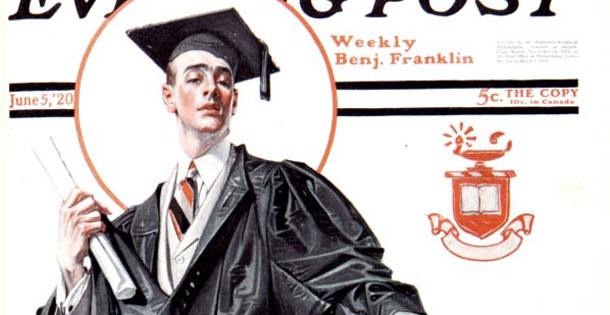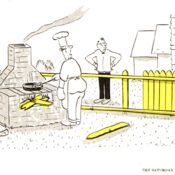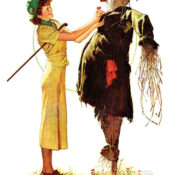In the 1930s, humorist J.P. McEvoy wrote the Post column “Father Meets Son” presented to readers in the form of letters filled with advice for navigating life’s rocky road. Employing a mix of wry humor and tough love, Dad doled out life lessons on everything from work to women. Readers loved it.
McEvoy starts his series at the beginning of his son’s adult life: college graduation. As his son enters the real world, Dad doesn’t so much let him fly free as kick him out of the nest.
Father Meets Son: On Commencement
Originally published on June 27, 1936
By J.P. McEvoyDear Son: This is your Commencement Day. That means your troubles are beginning and mine are ending. College is pushing you out of the nest and I’m pushing you off the limb. Down below you, pussycats are prowling, licking their chops. Above you, hawks are circling, ready to pounce on you. I hope college taught you how to cope with all this, because, if not, it is going to be just too bad for you.
You have been told the world is waiting for you. Boy, and how! The world has got a left hook like Joe Louis. The world has got a short inside right like Jack Dempsey in his prime. It will be all over you like Jumping Joe Savoldi. It will fall on you harder than Man Mountain Dean. Son, I could weep for what is going to happen to you.
I feel especially bad about it because somehow I can’t help thinking I am a little responsible for your present condition. I didn’t give you much thought when you were going through school, except when you wrote for money. It seems that when you could just about walk I rushed you out of the house into eight years of grade school, which prepared you for four years of high school, which prepared you for four years of college, which prepared you for nothing.
Some fellow—I think it was Shaw—said schools were invented by parents to get children out of the house. Well, thanks to the system, I’ve kept you out of the house up to date. The trick now, as I see it, is to keep you out.
“I am coming home in June, dad,” you say in your most recent letter. My reply is: “That’s what you think.” The world is waiting for you, son. You’ve had four years shadowboxing. Now you’re going to get right in the middle of it, where they hit you with everything, including the water bucket. I suppose I should have toughened you up with a little hard work, but it’s too late to worry about that now. I mean it’s too late for me to worry. You can start worrying.
I can’t help thinking how different things are today than they were when I was young and charming like you. I was brought up on a farm, where I learned how to reason with a mule. Son, if you can reason with a mule when you’re young, the world of men has no surprises for you when you grow up. I learned that you could eat a good apple in a minute, but it takes you all year to raise it. And you don’t sit around all that year singing, “Fight! Fight! Fight!” without ever lifting a hand. All winter you’re fighting the cold, and all spring you’re fighting the bugs; all summer you’re fighting the heat, and fall you’re fighting the slick buyers from the city. By the time I was fourteen I had some mighty fine back muscles, and I didn’t know as many things as you do, but they were all so.
I wish now you could have spent more time on a farm and less in a fraternity, but you didn’t, and that’s not your fault. I could have done something about it, I suppose, if I hadn’t been too busy with my own affairs to worry about yours. I hope you will forgive me on this bright June morning.
And I hope you don’t get the impression from this letter that I’m knocking college education. I think it is mighty fine for some boys. A lot of others it doesn’t do anything for at all, and certainly it ruins a lot more. I can’t help thinking you belong in that big middle group. You spent four years in a hotbed of knowledge and I had hoped you would become infected and come down with a fever. But knowledge is like good health; it’s not contagious. For four years you have been exposed to it, and judging from the results, I would say you are practically immune.
I can hear you say, “Whose fault is that?” and I reply after a certain amount of painful thinking: “Not yours, not mine, but ours.” I don’t think we have been as co-operative as we might have been. I should have taken more interest in your special problems and you could have taken a little more interest in mine. Together we might have got somewhere.
Perhaps it isn’t too late. Perhaps I won’t push you off the limb, after all. I think I’ll come out of my nest and try to teach you the first rudiments of flying. Eventually you will have to do your own flying—make no mistake about that—but school hasn’t taught you how to do it unless you call riding on my back flying.
This is your Commencement Day. I’m going to make it mine too. I take back what I said at the start of this letter—that your troubles are beginning and mine are ending. We’ll call them our troubles and face them together. The past is past. Let us salvage what we can and cut our losses. You have some mighty good assets to put in the pool. Youth, enthusiasm, health, and I hope you haven’t squandered all your curiosity.
For my part, I can contribute timing where you have speed, leverage where you have strength, and all the tricks of blocking and ducking which will keep you going long after the ability to take it has passed.
Yes, I have decided that I am going to reform. I am going to climb up into the corner with you, but you’ll have to listen to me between rounds. You have the idea now that the old man doesn’t know anything. He certainly doesn’t know as much as he has pretended to know. But he would be under the daisies long ago if he didn’t know something.
It won’t do you any harm to reform too. Stick out your ears instead of your chin. Remember, when you talk you only repeat what you already know, but if you listen, you may learn something.
Affectionately,
Dad
Next: A Disappointing Job, Part One
Become a Saturday Evening Post member and enjoy unlimited access. Subscribe now



